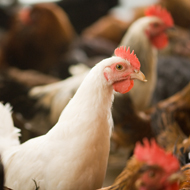Feather loss reduced in cage-free laying hens

59 per cent of 662 farmers reported that they had made changes on their farms during the first year to improve bird welfare.
Improved animal welfare initiatives have reduced feather loss in UK cage-free laying hens, according to new research.
Cage-free egg production systems account for 49 per cent of all eggs produced in the UK. The majority of these farms are farm assured under the RSPCA’s Freedom Food Scheme and some are certified to the Soil Association organic standards.
In a study published in the journal Animal Welfare, scientists show how such initiatives have helped to reduce feather loss and improvement in the welfare of almost two million cage-free laying hens.
In 2011 the RSPCA’ s Freedom Food and Soil Association farm assurance schemes introduced welfare assessment into their annual audits of laying-hen farms. Feather loss was assessed on 50 birds from each flock on a three-point scale for two regions of the body: head and neck (HN) and back and vent (BV).
In the study, the researchers analysed data from 830 and 743 farms in the first and second year, respectively. They found that in the first year, feather loss prevalence had reduced by 11 per cent for the HN region, and reduced by 10 per cent for the BV.
Furthermore, 59 per cent of 662 farmers reported that they had made changes on their farms during the first year to improve bird welfare.
Study co-ordinator Dr Siobhan Mulley from the University of Bristol said: “We estimated that around 1.8 million more hens were fully feathered in year two compared to year one. This is the first study to demonstrate the value to animal welfare of certification schemes monitoring the effectiveness of their own and other industry-led interventions to guide future policy.
“The study has shown that initiatives by private assurance schemes, scientists, charities, government and egg companies are able to deliver farm animal welfare improvements.”
Dr Jessica Elizabeth Stokes, animal welfare advisor at the Soil Association, added: “This initiative demonstrates the importance of sustained on farm monitoring and industry wide collective action to reduce key welfare issues such as feather pecking in laying hens.”
Mia Fernyhough, RSPCA laying hen specialist, explained: “This study not only demonstrates the significant improvements Freedom Food producers have made in tackling this important issue but the value of monitoring key welfare issues as part of good on-farm management.”



 RCVS Knowledge has welcomed Professor Peter Cockcroft as editor-in-chief for Veterinary Evidence.
RCVS Knowledge has welcomed Professor Peter Cockcroft as editor-in-chief for Veterinary Evidence.